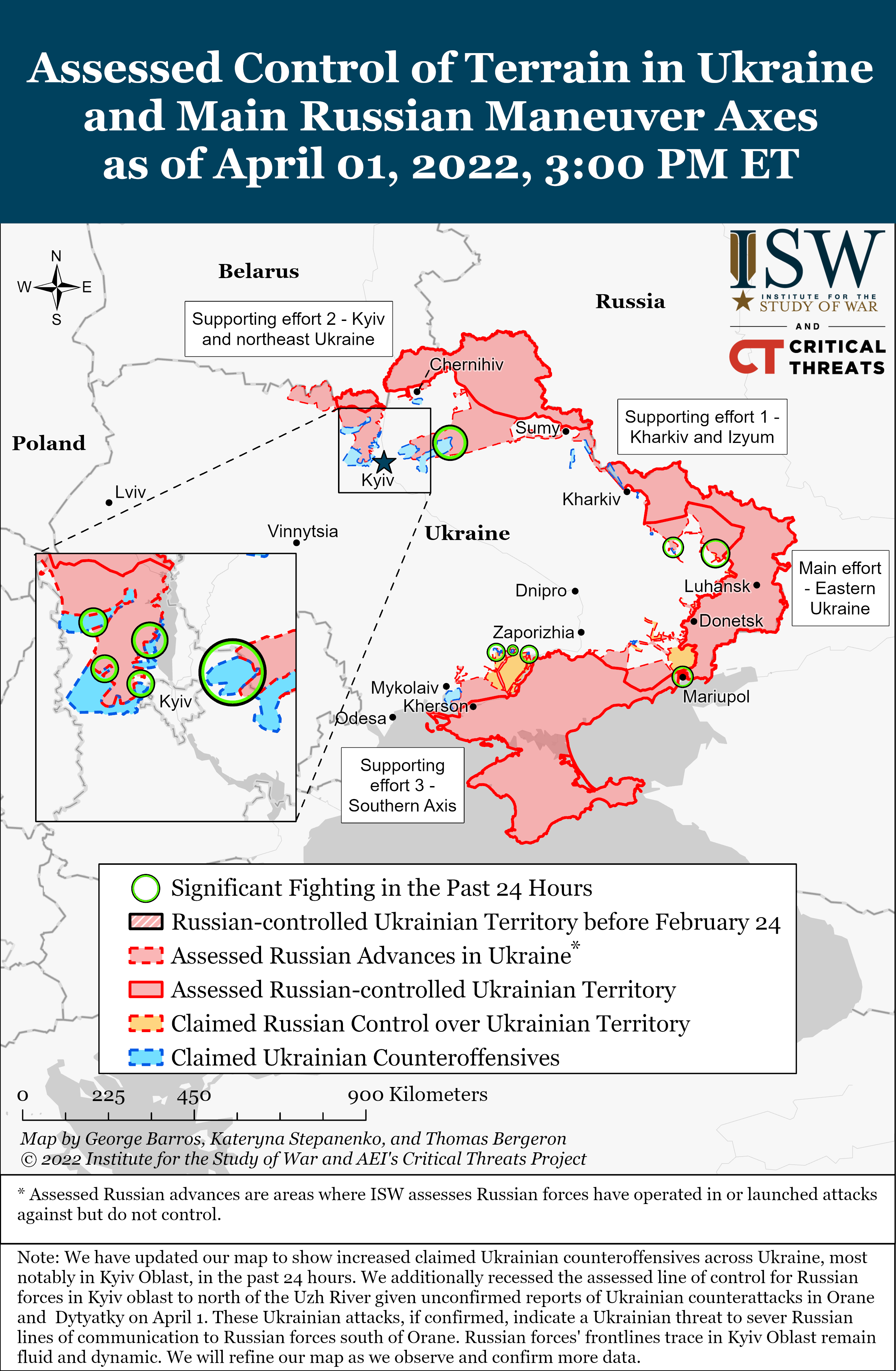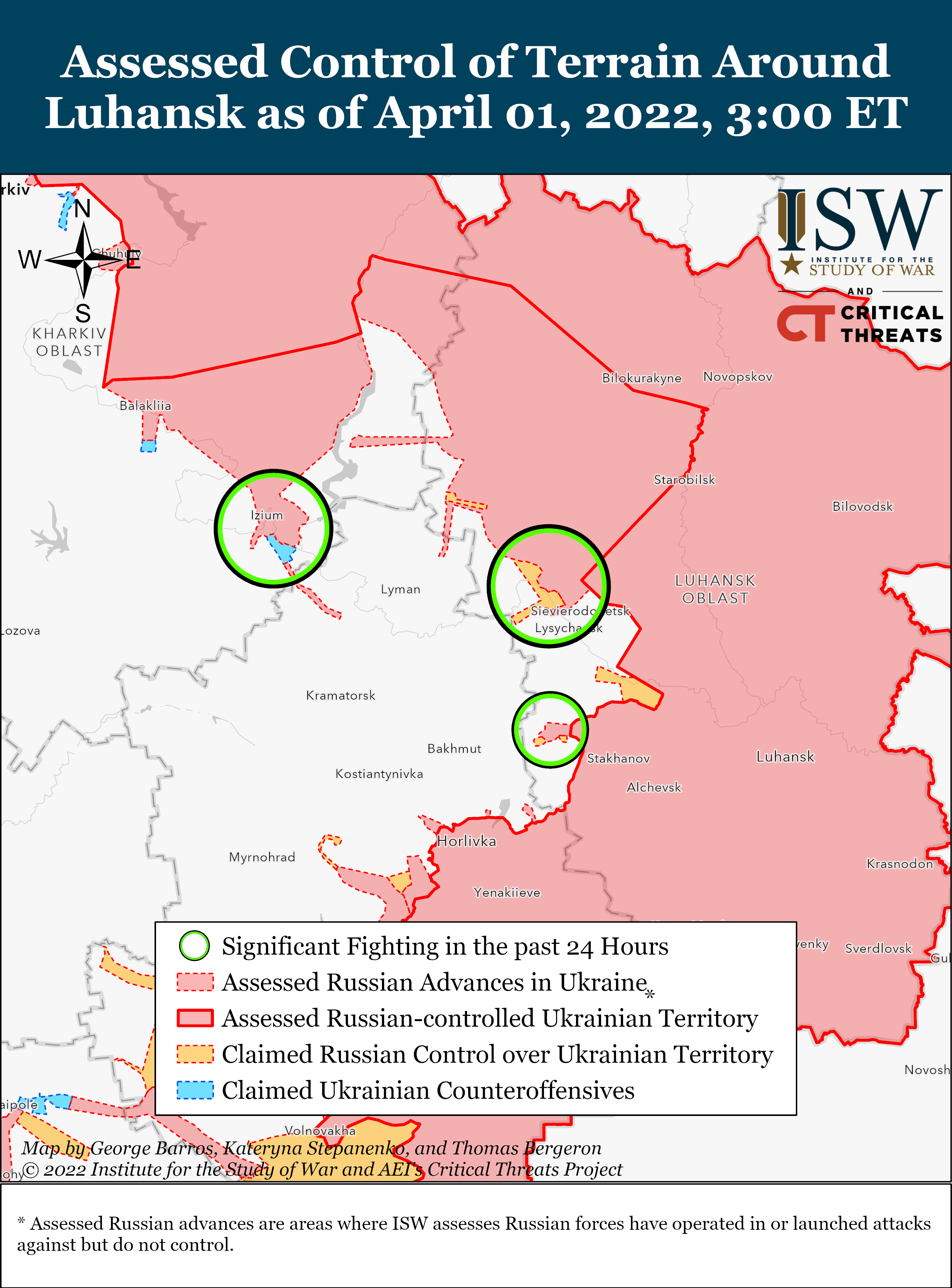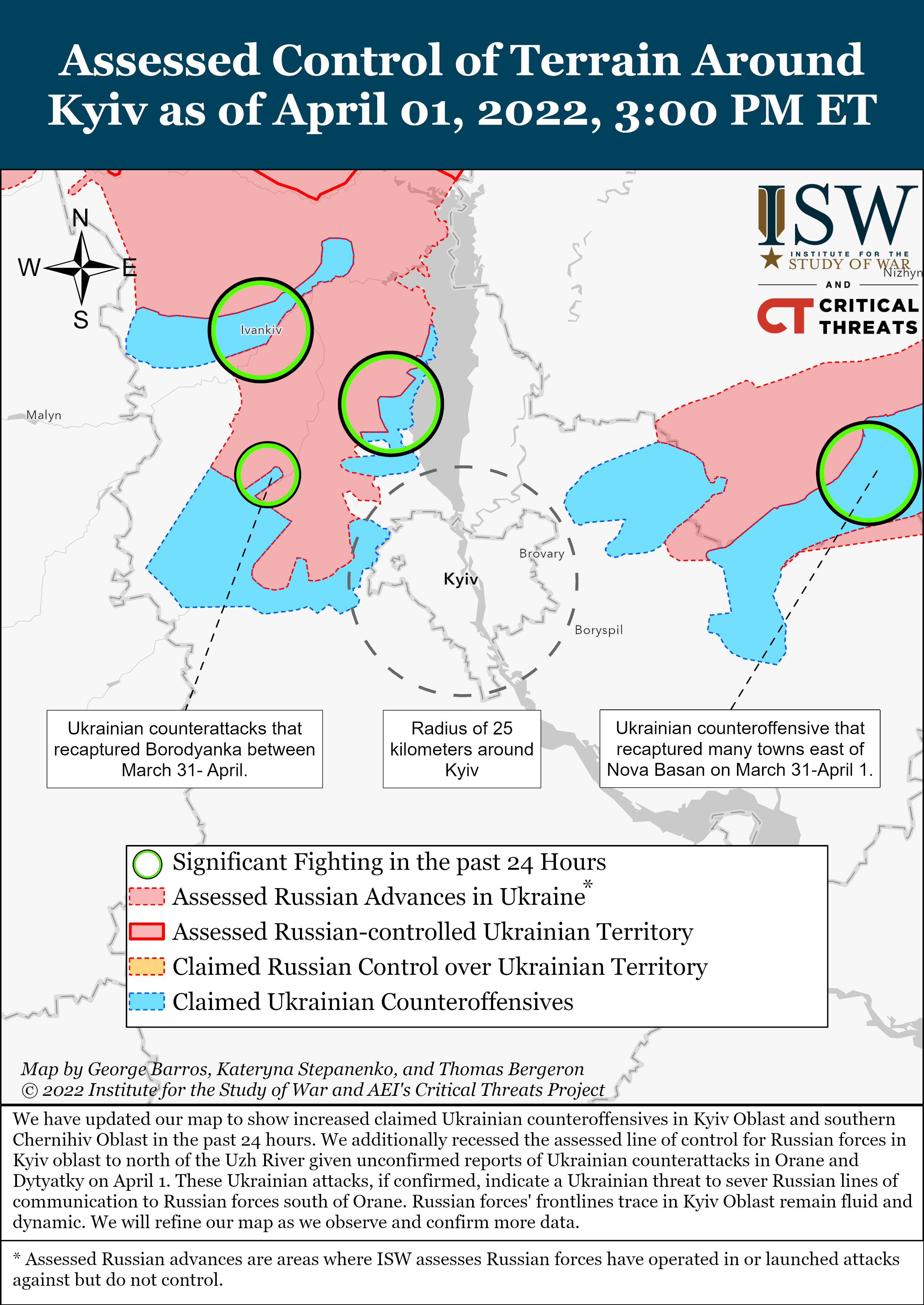*** MILITARY SITUATION ***
Russian Offensive Campaign Assessment, April 1st
The Kremlin has revised its campaign plan in Ukraine after the failure of its initial campaign to capture Kyiv and other major Ukrainian cities and its subsequent failure to adjust its operations in late March. ISW previously assessed that the initial Russian campaign of the war—airborne and mechanized operations to seize Kyiv, Kharkiv, Odesa, and other major Ukrainian cities to force a change of government in Ukraine—had failed as of March 19.[1] The Russian military continued to feed small collections of reinforcements into operations around Kyiv and across northeastern and southern Ukraine in an effort to keep its initial campaign plan alive throughout late March. We assess that the Russian military has now halted these failed efforts and is beginning a new phase of its campaign in Ukraine with new objectives. We are updating the structure of our campaign assessments to reflect the new structure and prioritization of Russian operations.
Russia’s main effort is now focused on eastern Ukraine, with two subordinate main efforts: capturing the port city of Mariupol and capturing the entirety of Donetsk and Luhansk Oblasts. The Kremlin claims the entirety of these oblasts as the territory of its proxies in eastern Ukraine, the Donetsk and Luhansk People’s Republics (DNR and LNR).[2] The Kremlin is increasingly redeploying troops from other axes of advance and channeling its remaining reinforcements from Russia into eastern Ukraine. Russian forces are unlikely to conduct active operations on other fronts in the coming weeks.
The Kremlin may intend to capture Donetsk and Luhansk Oblasts before seeking to negotiate a Kremlin-favorable ceasefire and claim that Russia has achieved its war aims. The Kremlin’s initial false justification for its unprovoked invasion of Ukraine was to protect the DNR and LNR from Ukraine and enable them to seize their “claimed” territory. The Kremlin is attempting to gloss over the failure of Russia’s initial campaign for a domestic Russian audience. The Kremlin has in fact been forced to alter its operations after the failure of its initial campaign. Kremlin claims that Russian forces solely attacked northeastern Ukraine to degrade Ukrainian forces before achieving the “main goal” of capturing Donetsk and Luhansk Oblasts – such as statements made by the Russian General Staff on March 25 – are false.
Russian forces have three supporting efforts: Kharkiv and Izyum; Kyiv and northeastern Ukraine; and the southern axis, including Kherson.
1) Russian forces on the Kharkiv axis have abandoned efforts to take the city. Their new objectives are likely to 1) pin Ukrainian mechanized forces in place, and 2) drive southeast to link up with Russian forces in Luhansk Oblast. Russian forces captured Izyum (southeast of Kharkiv) on April 1 after attempting to do so since at least March 7. Russian forces, including elements redeployed from the Sumy axis in the past week, will likely continue offensive operations in the coming days in an effort to cut off Ukrainian forces on the line of contact in Donbas.
2) Russian forces around Kyiv and in northeastern Ukraine seek to conduct a retrograde action—the orderly withdrawal of combat forces—for refit and further redeployment to other axes of advance. Russian forces remaining on the forward trace of Russian lines are a covering force intended to screen the retrograde of most of the combat power previously deployed around Kyiv. Ukrainian forces retook substantial territory both northwest and east of Kyiv in the past 24 hours. Ukrainian forces likely advanced faster than Russian forces anticipated, but Russian forces successfully withdrew much of the damaged combat power remaining around Kyiv into Belarus.
3) Russian forces on the southern axis—centered on Kherson—are unlikely to conduct offensive operations in the near future and will aim to defend Russian-occupied territory around Kherson against Ukrainian counterattacks. Russian forces will additionally likely prioritize securing southern Ukraine against increasingly frequent Ukrainian partisan actions. Russian forces are unlikely to resume offensive operations west toward Mykolayiv or north toward Zaporizhzhia and Kryvyi Rih in the near future.
-We now assess that Russia has revised its campaign plan in Ukraine after the failure of operations to seize Kyiv and other major Ukrainian cities throughout March.
-The Kremlin’s claims that Russia’s main objective has been eastern Ukraine throughout the war are false and intended to obfuscate the failure of Russia’s initial campaign.
-Russia’s main effort is now concentrated on eastern Ukraine. Russian forces seek to capture the entirety of Donetsk and Luhansk oblasts.
-Russian forces will likely take Mariupol in the coming days but continue to suffer heavy casualties.
-Russian forces seek to fix in place the Ukrainian forces around Kharkiv.
-Russian forces captured Izyum after three weeks of fighting on April 1 and will attempt to advance southeast to link up with Russian forces in Luhansk Oblast in the coming days.
-Ukrainian forces recaptured large swathes of terrain both northwest and east of Kyiv in the past 24 hours, but Russia successfully withdrew elements of its damaged forces into Belarus.
-The Kremlin will continue to funnel reinforcements (including both low-quality individual replacements from Russia and damaged units redeployed from northeastern Ukraine) into operations in eastern Ukraine, but these degraded forces are unlikely to enable Russia to conduct successful large-scale offensive operations.
- Senior US Defense officials state that the VKS has flown over 300 air sorties throughout Ukraine in the past 24 hours. Air strikes intensify over the Donbas, though Ukrainian air defense in this region remains active & effective.
-If the West does not continue supporting the Ukrainian Armed Forces with the material it truly needs (i.e., tanks, armored vehicles, air defense systems, fighter jets, etc.) then the success Ukraine is currently experiencing might not be sustainable.
*** ECONOMIC & POLITICAL ***-
- Hundreds of Syrian fighters are en route to join Russian forces in Ukraine, effectively returning the favor to Moscow for helping President Bashar al-Assad crush rebels in an 11-year civil war, according to two people monitoring the flow of mercenaries. A first contingent of soldiers has already arrived in Russia for military training before heading to Ukraine, according to a Western diplomat and a Damascus-based ally of the Syrian government. It includes at least 300 soldiers from a Syrian army division that has worked closely with Russian officers who went to Syria to support Mr. al-Assad during the war.
-The US department of defense will provide an additional $300m in security assistance to Ukraine, to include laser-guided rocket systems, drones, and commercial satellite imagery services.
-Russian missiles hit two cities in central Ukraine early on Saturday, damaging infrastructure and residential buildings, the head of the Poltava region said, according to Reuters
-The UK Ministry of Defence says the destruction of oil tanks at the depot means probable loss of fuel and ammunition supplies to invading forces. It will likely add more strain to Russia’s already stretched logistic chains. Supplies to Russian forces encircling Kharkhiv may be particularly affected.
-The US will work with allies to transfer Soviet-made tanks to Ukraine to bolster its defences in the Donbas region, the New York Times reported on Friday, citing a US official.
-The Hollywood actor Sean Penn has called for a billionaire to come forward and buy two squadrons of F-15 or F-16 aircraft for Ukraine in an unlikely attempt to tip the scales against the Russian invaders in the five-week-old war.
-The Russian invasion is leading to a dramatic decline in crops planted by farmers in the country this spring, with fears for domestic and international food security, writes Tom Levitt and Chris McCullough. Known for its fertile soils, Ukraine is a major exporter of wheat, barley, sunflower and maize, in particular to north Africa. However, farmers and analysts have told the Guardian that planting, harvest and export have all been disrupted by a lack of fertiliser, low or no fuel supplies for tractors, closure of ports and military activity. At least one-third of the land normally used for spring crops such as maize and sunflower is likely to go unplanted. Furthermore, one-third of the normal wheat harvest from the crop planted last autumn could be lost.
-The US is bracing for the possibility that Russia might use chemical or biological weapons against Ukraine, providing equipment and supplies that could be used to save lives after such an attack, White House press secretary Jen Psaki has confirmed. Psaki disclosed the aid effort on Friday, without giving details on the gear that’s being sent to Kiev. She added that giving the equipment to Ukraine won’t compromise US preparedness for chemical or biological attacks.
-The National Cyber Security Centre is investigating claims that China launched cyber-attacks on Ukrainian military and nuclear targets shortly before the Russian invasion, the UK government has said.
-Russian forces are hiding mines in houses and dead bodies as they retreat from northern parts of Ukraine, the Ukrainian president Volodymyr Zelenskiy said in a pre-dawn video address.
-Ukraine’s ‘International Legion’ no longer wants foreign recruits to fight Russia, a spokesman told Canada’s National Post on Friday. Despite Kiev once welcoming Western recruits with open arms, he has now revealed that supplies are low, and inexperienced volunteers aren’t ready for combat. Volunteers who’ve already made the journey have told horror stories of being sent to the front lines unarmed and untrained. Following the Russian offensive, videos emerged online of people claiming they joined the fight against Moscow’s forces, but were given no ammo or weapons by the Ukrainian side.
-The US military has cancelled plans to test an intercontinental ballistic missile in an effort to reduce tensions with Russia. After Russia put its nuclear forces on high alert in February, the Pentagon announced it would delay the test of the LGM-30G Minuteman III missile, saying both countries should “bear in mind the risk of miscalculation and take steps to reduce those risks”. US officials confirmed to Reuters today that it had cancelled the test entirely. Ann Stefanek, an air force spokesperson, said the decision was made for the same reasons the test was delayed.
-Around 200 Ukrainian national guard members have likely been taken prisoner by the Russian troops as they withdrew from the Chernobyl nuclear power plant, the mayor of Slavutych, Yuri Fomichev, said.
-Russia has ordered its universities to move all their Youtube content onto Russian social media platform VK Video and RuTube, the Russian video platform.
-Ukrainian President Volodymyr Zelensky has removed two of this own generals for being "traitors" - as he announced in a Friday post on the presidency's website. "Today another decision was made. Regarding antiheroes. Now I do not have time to deal with all the traitors. But gradually they will all be punished," Zelensky said, suggesting that he thinks more "traitors" are in the ranks which will soon be dealt with. The statement identified the pair of generals in the following: "That is why the ex-chief of the Main Department of Internal Security of the Security Service of Ukraine Naumov Andriy Olehovych and the former head of the Office of the Security Service of Ukraine in the Kherson region Kryvoruchko Serhiy Oleksandrovych are no longer generals," according to the presidency's website. These were top command posts. With the "Main Department of Internal Security" being the country's main intelligence agency. The president didn't specify what the allegations were, or the precise nature of their alleged traitorous activities, only do say they "have not decided where their homeland is" - suggesting perhaps pro-Russian sympathies, or also refusal to carry out state orders at the command level.
-Vladimir Putin is 'constantly' accompanied by a doctor specialising in thyroid cancer, a new investigation shows. Surgeon Yevgeny Selivanov, of Moscow's Central Clinical Hospital, has flown to the Russian leader no less than 35 times in Black Sea resort Sochi, his favourite place of residence. The respected doctor's thesis - showing his area of medical expertise - was entitled: 'Peculiarities of diagnostics and surgical treatment of elderly and senile patients with thyroid cancer'.
-In a significant escalation that is sure to have huge impact not only on the prospect for direct Russia-NATO military confrontation but also Europe's energy crisis and natural gas showdown with Moscow, Germany has approved "tanks" for Ukraine. "Germany has approved the delivery of 56 combat tanks to Ukraine, a German defense ministry spokesperson told CNN Friday," according to a breaking report. But more specifically these are in actuality 'infantry fighting vehicles' - and lighter than what CNN is referencing as conventional "combat tanks". The ministry described to CNN that "The tanks, which are type Pbv 501, stem from the Cold War-era East German army and had been sold to Sweden, then resold to the Czech Republic, who will deliver them to Ukraine." Germany has gone in a little over a month from being 'neutral' on weapons for foreign conflict, refusing to allow even third parties from shipping German-produced weapons to Ukraine, to now shipping some serious heavy military machinery.
-Russia has accused Ukraine of sending attack helicopters across the border to strike an oil storage facility in what would be the first raid on Russian soil since the outbreak of the war if confirmed. Ukraine has not confirmed that it launched the attack. Ukraine’s foreign minister, Dmytro Kuleba, said he could not confirm or deny Ukraine’s alleged involvement in a strike on a fuel depot in the Russian city of Belgorod because he was not privy to all military information, Reuters reports.
-The Associated Press has a helpful report on the helicopter strike of an oil storage facility in Belgorod, Russia, about 16 miles from the border that is parallel to Kharkiv in Ukraine. Russia says that Ukraine is behind the strike and the huge fire that it caused, but Ukrainian officials have been denying involvement. According to the report, Russian social media users have been expressing surprise that the Ukrainians were able to get past Russian air defenses, given that Russia’s daily briefings have been emphasizing the number of Ukrainian planes and helicopters shot down.
-Fertilizer prices are at record highs following Russia's invasion of Ukraine puts massive pressure on American farmers to transition to crops that need less fertilizer. A Bloomberg survey found that farmers will plant 2 million more acres of soybeans and about 2 million fewer of corn. That's because soybeans require very little fertilizer versus corn. Farmer Tim Gregerson of Omaha, Nebraska, said he'll plant more soybeans this year because "fertilizer is out of control." He said fertilizer prices spiked even before the Russian invasion, and it was then he decided to reduce the corn-to-soy ratio to about 50-50 this upcoming growing season. On top of soaring fertilizer prices, he told Bloomberg, diesel, tractors, machine parts, feed for livestock, herbicide, and seed costs, and just about everything to do with farming are astronomically higher this year. Farmer John Gilbert near Iowa Falls, Iowa, said his decision was made in January when fertilizer prices spiked. A gauge of prices for US Gulf Coast Urea, US Cornbelt Potash, and NOLA Barge DAP, called the Green Markets North American Fertilizer Price Index, is up 43% since the Russian invasion and up 233% to $1,270 per ton since the start of the 2021 growing season. The rising cost of natural gas, the primary input for most nitrogen fertilizer, has been one reason for rising fertilizer prices. Also, global supplies are expected to tighten as Russia will limit fertilizer exports to 'unfriendly' countries. Russia is one of the biggest exporters globally -- the US just so happens to be a large importer of nitrogen and potash from Russia.
-Japan has Officially Stated after negotiation between the two Countries since the end of WW2 recently entirely collapsed that the entire Kuril Island Chain is Japanese Sovereign Territory and is being Illegally Occupied by Russian Forces.
-Pakistani Information Minister Fawad Chaudhry announced on Friday that the country’s security agencies reported a plot to assassinate Pakistani Prime Minister Imran Khan. “After these reports, the prime minister’s security has been beefed up as per the government’s decision,” Chaudhry said, as cited by the Dawn media outlet.




No comments:
Post a Comment